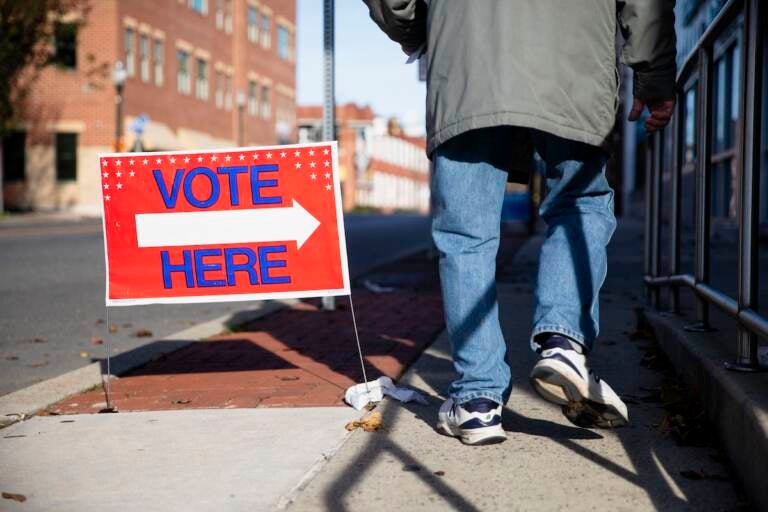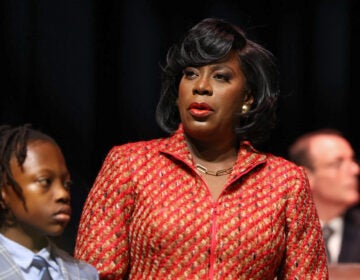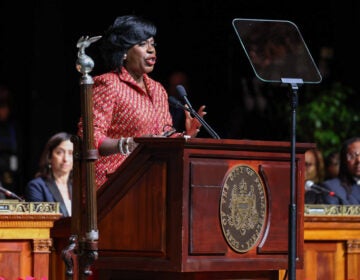What you need to know about the 2023 Pa. general election
Statewide, voters will weigh in on consequential judicial races. In Philadelphia, voters will elect the city's 100th mayor. Here's everything you need to know.

Pennsylvania voters take to the polls in Harrisburg on Election Day, Nov. 8, 2022. (Amanda Berg / For Spotlight PA)
Jump to a section
- What are the deadlines I need to know?
- Can I still register to vote?
- Who can register to vote?
- Can I still apply for a mail or absentee ballot?
- Can I vote early in person?
- How can I become a poll worker?
- What do I need to know about Pa.’s mail ballot rules?
- Where can I drop off my mail ballot?
- When must mail ballots be received?
- How will I know if my mail ballot was processed?
- What if I want to vote in person?
- Where is my polling place?
- What if I received an absentee or mail ballot but want to vote in person?
- What happens if I request a mail ballot and don’t receive it?
- What is an accessible remote ballot, and how do I get one?
- Will my polling place be accessible?
- What is an alternative ballot, and who is eligible to receive one?
- What if I need assistance at my polling place?
- Can a third party apply for and deliver my mail ballot?
- Who is on the ballot?
- What else is on the ballot?
- Voter info & resources
What are the deadlines I need to know?
Below are deadlines specific to voting in the general election.
Deadline to register to vote: Monday, Oct. 23Deadline to apply for a mail or absentee ballot: 5 p.m. Tuesday, Oct. 31- Deadline to return mail or absentee ballot: 8 p.m. Tuesday, Nov. 7
Can I still register to vote?
The deadline for Pennsylvanians to register to vote for the general election was Monday, Oct. 23. Pennsylvanians can find out whether they are registered to vote online.
Who can register to vote?
Anyone can register to vote, so long as they will have been a U.S. citizen for at least 30 days before the election, are a resident of Pennsylvania, and are going to be at least 18 on or before Election Day.
People who are incarcerated for felonies can’t vote under state law. People who are serving time for lesser charges or are out on probation, parole, or house arrest are eligible.
Can I still apply for a mail or absentee ballot?
Yes. Those eligible may apply for a Pennsylvania mail or absentee ballot through 5 p.m. Tuesday, Oct. 31. Here’s everything you need to know about requesting, filling out, and returning your mail ballot.
Can I vote early in person?
If you are a registered Pennsylvania voter, you may choose to vote early in person.
Once ballots are ready, you can request, receive, vote, and cast your mail or absentee ballot in one visit to your county election board or other officially designated site.
The last day to vote early in person was Tuesday, Oct. 31.
How can I become a poll worker?
Those interested in becoming a poll worker may fill out the Pennsylvania poll worker interest form. A county election official will follow up with those interested post-submission.
To become a poll worker, residents must be registered to vote in the county they wish to work. Seventeen-year-old high school students interested in becoming poll workers must meet additional requirements and should contact their county election office for more information.
Government officials and employees are not allowed to serve as poll workers, with the exception of district judges, notaries public, and members of the Pennsylvania National Guard.
Poll workers typically work from before the time polls open at 7 a.m. on Election Day until after the polls close at 8 p.m.
What do I need to know about Pa.’s mail ballot rules?
Here’s everything you need to know about requesting, filling out, and returning your mail ballot to ensure that your vote is counted.
Where can I drop off my mail ballot?
For those who choose to vote by mail, counties will provide secure drop box locations for ballots.
Once available, official drop box locations for Bucks, Chesco, Delco, Montco, and Philadelphia can be found online. WHYY’s Billy Penn has a map of drop boxes in Philly.
When must mail ballots be received?
Completed mail or absentee ballots must be received by county boards of elections by 8 p.m. on Election Day. Postmarks do not count.
If there isn’t enough time to mail the ballot, a voter can drop it off in person at their county elections office or, if available, at a county drop box.
How will I know if my mail ballot was processed?
Voters can check the status of their mail ballots online.
What if I want to vote in person?
Pennsylvanians who would prefer to vote the old-fashioned way can do so in person on Election Day at the polls, which will be open from 7 a.m. to 8 p.m. Voters can find their polling places online. Billy Penn also has a map of Philadelphia polling places.
Where is my polling place?
Voters can find their polling places online. Billy Penn also has a map of Philadelphia polling places.
What if I received an absentee or mail ballot but want to vote in person?
Voters who receive absentee or mail ballots can opt to vote in person on Election Day. To do so, voters must bring their ballots and the pre-addressed outer return envelopes to be voided. After they surrender their ballots and envelopes and sign a declaration, they can vote using a regular ballot.
What happens if I request a mail ballot and don’t receive it?
Voters who request a mail ballot but don’t receive it, or don’t have it to surrender, may vote by provisional ballot at their polling places. The provisional ballots will be reviewed by the county board of elections post-Election Day to determine whether they will be counted.
What is an accessible remote ballot, and how do I get one?
Accessible remote ballots allow voters who use screen readers and assistive devices to vote a mail ballot privately and independently.
Before applying for an accessible remote ballot, voters must first apply for an absentee or mail ballot.
Voters may request an accessible remote ballot online or fill out an accessible PDF application that can be mailed to a voter’s county board of elections or emailed to ra-awib@pa.gov. Voters are encouraged to submit an accessible remote ballot request within 24 hours of applying for their mail or absentee ballot.
Will my polling place be accessible?
Voters can look up their polling place to see if it is accessible (under Pennsylvania’s accessibility criteria). Voters who are over 65 or who have a disability — and whose polling places are inaccessible — may be eligible to vote via an alternative ballot by mail.
What is an alternative ballot, and who is eligible to receive one?
An alternative ballot is a paper ballot that voters receive via mail and return to their county board of elections.
Voters who are over 65 or who have a disability — and whose polling places are inaccessible — may be eligible to vote via an alternative ballot by mail. Voters can check their alternative ballot eligibility and apply for an alternative ballot online.
Voters must submit their alternative ballot application no later than 5 p.m. on Tuesday, Oct. 31. In an emergency, voters can also submit an emergency application for an alternative ballot to their county election office no later than 8 p.m. on Election Day.
What if I need assistance at my polling place?
People with disabilities who need help voting may bring a person of their choice to assist them in the voting process (that person cannot be a judge of elections or the voter’s union representative or employer). The first time doing so, such voters will be asked to complete and sign a Declaration of Need of Assistance (also available in Spanish, Traditional Chinese, Simplified Chinese and Vietnamese). After the first time, voters’ registration records will note prior completion of the form.
Can a third party apply for and deliver my mail ballot?
Voters who have a disability that prevent them from applying for or delivering a mail ballot in person may designate an agent to deliver their ballot materials for them (also available in Spanish, in Chinese, or in a form provided by their county).
Voters with a permanent disability may also apply to be added to the permanent absentee voter list.
Who is on the ballot?
State Supreme Court
For the state’s high court, voters will decide who succeeds Justice Max Baer on the Pennsylvania Supreme Court. Baer died in September 2022, shifting the court from a 5-2 to a 4-2 Democratic majority.
Daniel McCaffery (D) faces Carolyn Carluccio (R) for the open seat. McCaffery, an Army veteran who was elected to Pennsylvania Superior Court in 2019, previously served as an attorney and assistant DA in Philly. Carluccio has served as a judge on the Montgomery County Court of Common Pleas since 2010. Previously, she served as assistant U.S. attorney and Montgomery County’s chief public defender.
Here’s a breakdown on the Pennsylvania Supreme Court, and why it matters.
Intermediate appellate courts
On the Pennsylvania Superior Court, two judges are up for nonpartisan retention elections. Judge Vic Stabile (R), seeks a second term on the Pennsylvania Superior Court. President Judge Jack Panella (D) seeks a third.
Two Superior Court seats are also up for election to fill the vacancy created by Judge Jacqueline Shogan, who retired in 2022, and the forthcoming vacancy created by Judge John T. Bender, who will reach the mandatory retirement age of 75 in November. Vying for the seats are Republicans Maria Battista and Harry Smail and Democrats Jill Beck and Timika Lane.
Another seat is up for grabs on the Pennsylvania Commonwealth Court due to the vacancy left by Judge Kevin Brobson (R), who was elected to the state Supreme Court in 2021. Republican Megan Martin faces Democrat Matt Wolf.
Curious about what these courts are and why they matter? Here’s a breakdown on the Pennsylvania Superior Court and the Pennsylvania Commonwealth Court.
Philadelphia suburbs
In the Philly suburbs, all Board of Commissioners seats are up for grabs in Bucks, Chester, and Montgomery counties. Here’s a breakdown of the candidates running:
And in Delaware County, Republicans are challenging Democrats’ first-ever council majority.
Philadelphia mayor, City Council, and beyond
In Philly, former City Councilmembers Cherelle Parker (D) and David Oh (R) are vying to become the city’s 100th mayor.
Also on the ballot are at-large City Council seats, for which voters can choose no more than five:
- Jim Harrity (D)
- Katherine Gilmore Richardson (D)
- Isaiah Thomas (D)
- Nina Ahmad (D)
- Rue Landau (D)
- Jim Hasher (R)
- Drew Murray (R)
- Kendra Brooks (WFP)
- Nicolas O’Rourke (WFP)
On the district level, 10 City Council seats are on the ballot. Incumbents Mark Squilla (D-1), Kenyatta Johnson (D-2), Curtis Jones (D-4), Jeffery Young Jr. (D-5), Michael Driscoll (D-6), Quetcy Lozada (D-7), Cindy Bass (D-8), and Anthony Phillips (D-9) are all running unopposed.
That leaves two districts with City Council races to watch: In District 3, incumbent Jamie Gauthier (D) faces challenger Jabari Jones (West is Best). In District 10, Councilmember Brian O’Neill (R), who has held the Far Northeast council seat for 43 years, faces Democratic challenger Gary Masino.
Further down the ballot, John Sabatina Jr. (D) faces Linwood Holland (R) in the race to become Philadelphia’s register of wills; Incumbent Rochelle Bilal (D) faces Republican challenger Mark Lavelle in the sheriff’s race; and Christy Brady (D) and Aaron Bashir (R) are vying to become Philadelphia’s next city controller. City Commissioners Lisa Deeley (D), Omar Sabir (D), and Seth Bluestein (R) are all running unopposed.
WHYY’s Billy Penn has more on how Philly’s City Council election works, and who’s running, and the ever-indispensable procrastinator’s guide to Philly’s general election.
Citywide judicial offices
On the Philadelphia Court of Common Pleas, the following candidates are running in partisan elections:
- Jessica Brown (D)
- Damaris Garcia (D)
- Chesley Lightsey (D)
- Brian McLaughlin (D)
- John Padova Jr. (D)
- Natasha Taylor-Smith (D)
- Caroline Turner (D)
- Tamika Washington (D)
- Samantha Williams (D)
- Kay Yu (D)
The following Court of Common Pleas judges are running in retention elections:
- Anne Marie B. Coyle
- Giovanni O. Campbell
- Holly J. Ford
- J. Scott O’Keefe
- Jacqueline F. Allen
- Joe Fernandes
- Joel S. Johnson
- Nina N. Wright Padilla
- Paula A. Patrick
- Ramy I. Djerassi
- Rayford A. Means
- Sierra Thomas Street
- Timika Lane
Voters will also choose two judges of the Philadelphia Municipal Court. Running are McIntyre Osborne (D), Barbara Thomson (D), and Rania Major (R).
Several Municipal Court judges are also running in retention elections:
- Brad Moss
- David Shuter
- Karen Simmons
- Marissa Brumbach
- Marvin L. Williams
- Matt Wolf
- William Meehan Jr.
What else is on the ballot?
There are no statewide ballot measures this year, but some voters may see local ballot questions. That includes Chester County and Philadelphia residents.
WHYY’s Billy Penn has more on a Philly ballot question, which asks voters whether Philadelphia should enshrine an Office for People with Disabilities in the city charter.
Voter info & resources

Get daily updates from WHYY News!
WHYY is your source for fact-based, in-depth journalism and information. As a nonprofit organization, we rely on financial support from readers like you. Please give today.







